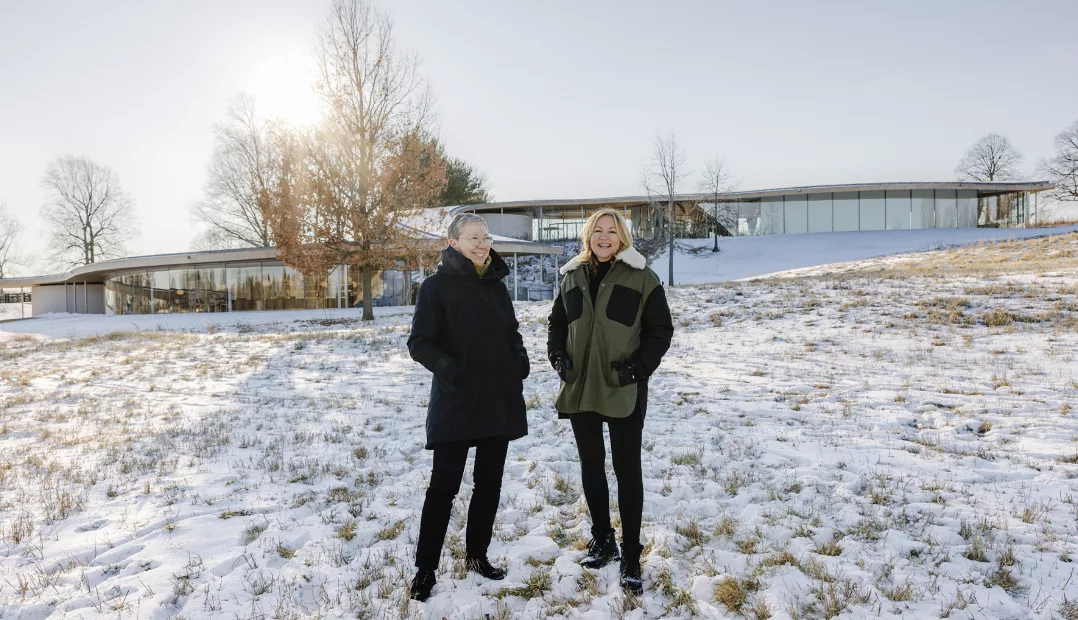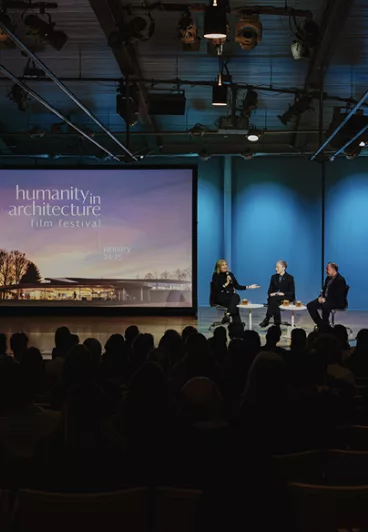
By Elizabeth Barhydt
The built environment has always been a reflection of human ambition, ingenuity, and, in some cases, hubris. But what if architecture could do more than shape skylines—what if it could actively foster a more humane world? Last weekend, Grace Farms, in collaboration with the Architecture and Design Film Festival (ADFF), sought to answer that question with the first-ever Humanity in Architecture Film Festival. Over two days, January 24-25, the event showcased eleven films that examined how design can enrich the human experience and serve as a force for positive change.
Sharon Prince, CEO and Founder of Grace Farms, framed the festival as a challenge to conventional perspectives on architecture. “Architecture can be a driver of humanitarian outcomes,” she said. “It was incredible to welcome hundreds of people to Grace Farms to experience these award-winning films throughout the River building. The Humanity in Architecture Film Festival recognizes the unique power that design can have to create positive change in the world.”
The festival’s opening night featured the premiere of Strange & Familiar: Architecture on Fogo Island, a documentary chronicling the efforts of social entrepreneur Zita Cobb to transform a remote Newfoundland community through design. The Fogo Island Inn, conceived by architect Todd Saunders, is both an homage to the island’s rugged terrain and a model for economic resilience.
A discussion followed, featuring Cobb, Prince, ADFF Founder Kyle Bergman, and Grace Farms Architecture Advisor Toshihiro Oki. The panel explored architecture’s capacity to create not just buildings, but also opportunities for belonging, identity, and sustainability.
“Be thoughtful about every step, and if possible, make it here,” Cobb said, emphasizing the importance of local craftsmanship in the construction and furnishing of the Fogo Island Inn. Her words underscored a recurring theme throughout the weekend: that architecture is most meaningful when it is deeply rooted in place, history, and community.
Saturday’s programming immersed attendees in a series of ten films, each engaging with the question of how the built world shapes—and is shaped by—human experience. The festival extended beyond the screen, incorporating live music from Grace Farms’ Music Director Marcus G. Miller and offerings from Grace Farms Tea & Coffee, a Certified B Corp. The combination transformed the experience from passive viewing to a fully embodied engagement with the festival’s themes.
One of the standout screenings was Tokyo Ride, an intimate, black-and-white road film that follows architects Ryue Nishizawa and Kazuyo Sejima, founders of the celebrated firm SANAA, as they navigate Tokyo’s urban landscape. The film served as a fitting conclusion to the festival, encapsulating the dialogue between physical space and imagination. Nishizawa and Sejima’s work—including Grace Farms’ River building—exemplifies how architecture can be an open-ended, dynamic conversation rather than a fixed monument.
Beyond the films, the festival highlighted the urgency of ethical considerations in architecture. Grace Farms has positioned itself at the forefront of the Design for Freedom movement, an initiative to eradicate forced labor from global building material supply chains. In an industry often criticized for its opacity, the movement seeks to instill transparency and accountability, ensuring that the human cost of construction is not an afterthought but a central concern.
Grace Farms itself is a case study in architecture’s potential to transcend its material constraints. Designed by SANAA, the River building appears to dissolve into the surrounding 80-acre landscape, a structure that is less an imposition on nature than an extension of it. The festival, unfolding across this space, served as a reminder that buildings are never inert; they shape our behaviors, our interactions, and even our ethics.
For two days, the Humanity in Architecture Film Festival made the case that architecture is not just an art form, nor merely a technical discipline—it is a moral undertaking. Each film, in its own way, posed the question of what it means to build with intention, whether in the remote terrain of Newfoundland, the dense fabric of Tokyo, or the rolling meadows of New Canaan. If the festival’s attendees left with a single insight, it was perhaps this: the spaces we inhabit, and the choices behind their creation, reveal not only our values but our aspirations for the future.


